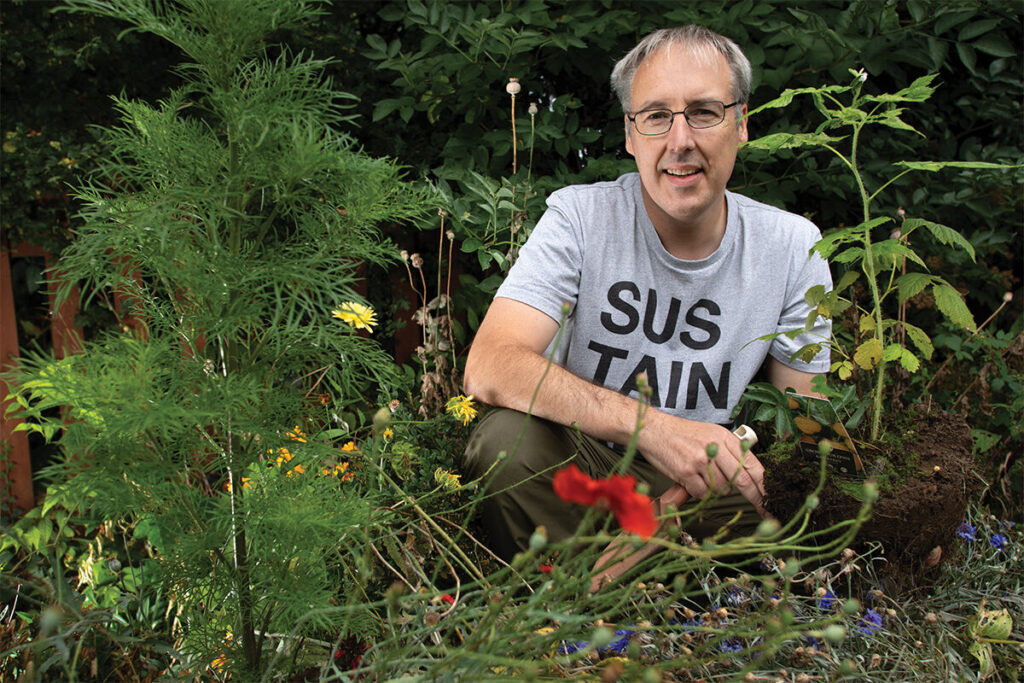Caring for patients and the planet

Dr Matt Sawyer describes a typical week running a sustainability consultancy alongside GP clinics
Monday
The week starts as usual, with conventional GP work. I am enjoying the current prevalence of telephone consultations. I can spend longer with patients who need extra time, such as those with mental health problems who want to talk. There is still a lot of anxiety about Covid – whether fear of catching the virus despite the successful vaccination programme, or the continued effects on work, socialising or just leaving the house.
Patients who need an appointment are of course offered one, and I notice I’m seeing a pair of testicles a day at the moment.
Tuesday
Onto planetary health now, by presenting to the Sustainable Healthcare Coalition on how to decarbonise primary care.
The prize is the health of the UK by the country meeting our climate commitments. As pointed out by The Lancet, this would mean 125,000 lives not ending prematurely. The Global Road Map for Healthcare Decarbonisation by Health Care without Harm has three actions: to declare a climate emergency; make zero emission commitments; and develop a route to achieve this. I passionately believe primary care and practices, PCNs and CCGs should be doing this.
The afternoon involves an excess of ExCel. I’m carbon footprinting a big practice and am working through thousands of invoices for products and services. I’ve calculated their total cumulative km travelled (450,000) and converted this into carbon emission. It’s useful for a practice to understand what they can change.
Wednesday
Midweek brings discussions with a big acute trust on sustainable travel plans for patients and staff. As Mike Berners-Lee pointed out in his book There is No Planet B, for each mile travelled in a diesel car in an urban setting, 12 minutes of life are lost by the community. So the five-mile trip to the GP practice or to drop the children at school cost one hour of life.
A CCG would like a session on the local impacts of climate change on its practices and patients. This would be an introduction to the importance of carbon literacy for both clinical and non-clinical staff. I put it in the diary and plan the interactive parts of the session.
I present to a pharmaceutical company on the importance of inhaler propellants. Metered-dose inhalers represent 13% of the carbon footprint from primary care. Improving patient respiratory health and reducing our damage to the climate can be achieved simultaneously by considering the whole respiratory care pathway.
Thursday
Recently we had World Earth Day, although I’m cynical about having a single day for an important issue, as it can then be forgotten. But I perk up when I receive a batch of reusable face-masks in a trial for clinical staff in low-risk work. These are ideal for general practice as the environmental impact of non-reusable masks and other single-use PPE is depressingly high. I’m reminded we need a sustainability lead on each infection prevention and control team.
Later, it’s back to the Carbon Literacy Project, which is rolling out training across the UK. We have a primary care course and are currently working on a secondary care one. The former works well as it has a blend of self-directed learning, with a workshop for turning intention into action. The course designer wanted to understand the benefits of bitesize learning for clinicians, and also the importance of having the course delivered by a peer for added impact.
Friday
I catch up with colleagues who deliver carbon literacy training to other sectors across Yorkshire, which is always positive. We’re not doing this alone.
I finish the carbon footprint report, arrange the workshop for the pharmaceutical company; discuss training energy managers for primary care, and implement energy reduction schemes. But most excitingly, I look forward to wearing my reusable mask in surgery on Monday.
Profile: Dr Matt Sawyer
Location
Bedale, North Yorkshire
Roles
GP partner
Runs sustainability consultancy focusing on how to help primary care to reach net zero with practical tools and resources
Hours worked per week
Typical full GP hours on Mondays and Tuesdays, variable working on carbon issues for the rest of the week
Related Articles
READERS' COMMENTS [2]
Please note, only GPs are permitted to add comments to articles










A day in the life of The Day of the Triffids
Bonkers.
China built over 250 new coal fired power stations last year. Decarbonising your surgery will definitely make a difference, oh yes.